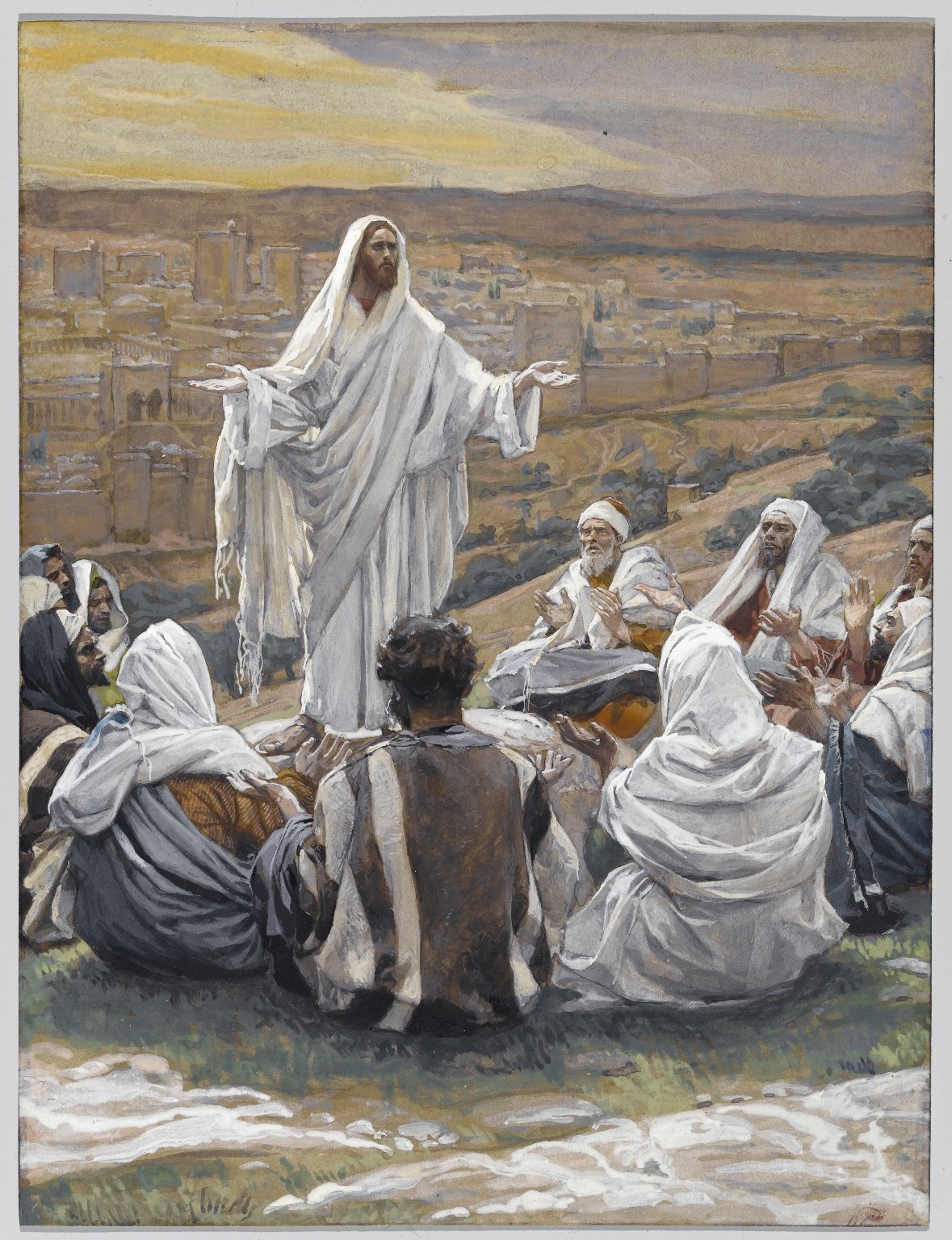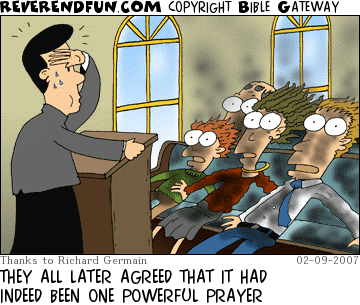Worship Helps for Pentecost 10
Artwork: The Lord’s Prayer
760 When Peace Like aRiver
Refrain
Refrain
Artist: James Tissot
Worship Theme:
God has given most people the wonderful
gift of speech. Through words we communicate our thoughts, ideas and feelings.
Without words it would be much harder to express ourselves, a frustrating
prospect! Our thoughts, ideas and feelings need an outlet, and so does our
faith-life! Faith looks for ways to express itself, and one way Christian faith
does that is in fervent faith-filled prayer.
Old Testament: Genesis 18:20–32
20So the Lord said, “Because the outcry against Sodom and Gomorrah is
great, and because their sin is very flagrant, 21I will go down now and
see if what they have done is as bad as the outcry that has come to me. If not,
I will know.”
22The two men turned from there and
went toward Sodom, but Abraham remained standing before the Lord. 23Abraham approached
him and said, “Will you really sweep away the righteous along with the wicked? 24What
if there are fifty righteous people in the city? Will you really sweep them
away and not spare the place for the sake of the fifty righteous who are in it?
25You would never do such a thing, killing the righteous along with
the wicked, treating the righteous the same as the wicked. You would never do
such a thing. The Judge of all the earth should do right, shouldn’t he?”
26The Lord
said, “If I find fifty righteous people within the city of Sodom, then I will
spare the entire place for their sake.”
27Abraham answered, “See now, I who
am but dust and ashes have taken it on myself to speak to my Lord. 28What
if there are five fewer than fifty righteous? Will you destroy the entire city
if the number is five short?”
He said, “I will not destroy it if I find
forty-five there.”
29He spoke to him yet again and said,
“What if only forty are found there?”
He said, “I will not do it for the sake of
the forty.”
30He said, “Please, do not be angry,
my Lord, but I will speak again. What if thirty are found there?”
He said, “I will not do it, if I find
thirty there.”
31He said, “See now, I have taken it
upon myself to speak to my Lord. What if there are twenty found there?”
He said, “I will not destroy it for the
sake of the twenty.”
32He said, “Please, do not be angry,
my Lord, but I will speak just once more. What if ten are found there?”
He said, “I will not destroy it for the
sake of the ten.”
1. When Abraham found out that the Lord was planning
destruction for Sodom and Gomorrah what did he do?
2. What does this story teach us about our life of
Christian prayer?
Epistle: James 5:13–18
13Is anyone among you suffering? He
should pray. Is anyone cheerful? He should sing songs of praise. 14Is
anyone among you sick? He should call the elders of the church, and they should
pray over him, anointing him with oil in the name of the Lord. 15And
the prayer offered in faith will save the sick person, and the Lord will raise
him up. If he has committed sins, he will be forgiven. 16So confess
your sins to one another and pray for one another, in order that you may be
healed. The prayer of a righteous person is able to do much because it is
effective. 17Elijah was a man just like us. He prayed earnestly that
it would not rain, and it did not rain on the land for three years and six
months. 18Then he prayed again, and the sky gave rain, and the land
produced its harvest.
3. What does James say the people to whom he was first
writing should do if they are sick?
4. What proof does James give that the prayer offered in
faith will make the sick person well?
Gospel: Luke 11:1–13
On another occasion, Jesus was praying in
a certain place. When he finished, one of his disciples said to him, “Lord,
teach us to pray, just as John also taught his disciples.”
2He said to them, “When you pray, say, ‘Our
Father in heaven, hallowed be your name. Your kingdom come. Your will be done
on earth as it is in heaven. 3Give us each day our daily bread. 4Forgive
us our sins, as we also forgive everyone who sins against us. And lead us not
into temptation, but deliver us from evil.’”
5He said to them, “Suppose one of you has a
friend, and you go to him at midnight and tell him, ‘Friend, lend me three
loaves of bread, 6because a friend of mine who is on a journey has
come to me, and I do not have anything to set before him.’ 7And the
one inside replies, ‘Don’t bother me. The door is already locked, and my
children and I are in bed. I can’t get up and give it to you.’ 8I
tell you, even if he will not get up and give him anything because he is his
friend, yet because of his bold persistence, he will get up and give him as
much as he needs.
9“I tell you, keep asking, and it will be
given to you. Keep seeking, and you will find. Keep knocking, and it will be
opened to you. 10For everyone who asks receives. The one who seeks
finds. And to the one who knocks, it will be opened.
11“What father among you, if your son
asks for bread, would give him a stone? Or if he asks for a fish, would give
him a snake instead of a fish? 12Or if he asks for an egg, would
give him a scorpion? 13If you then, though you are evil, know how to
give good gifts to your children, how much more will your heavenly Father give
the Holy Spirit to those who ask him?”
5. With his illustration in verses 11:5-8, what is Jesus
teaching us about our life of prayer? How should we pray?
6. What encouragement is Jesus giving us about our life
of prayer in verses 9-13?
Answers:
1. Abraham prayed to the LORD, asking him to spare
the cities for the sake of righteous people who may have been living there.
Abraham was especially concerned about his nephew Lot (whom God would in fact
spare from the fiery destruction that fell on Sodom).
2. Abraham shows us how bold and fervent we can and
should be in our faith-filled prayers to the LORD, because of his great mercy.
Abraham “persuaded” the LORD to spare Sodom and Gomorrah if he found only ten
righteous people in them. Therefore, when you pray, do not quit. Keep appealing
to God’s mercy in Christ.
3. He says they should ask church elders to come and
pray over them and put olive oil on them. (Olive oil may have been
soothing/medicinal and probably also brought with it a symbol of God’s
blessing. That may be one reason elders were to bring it, not just family or
friends.)
4. To prove that God can and does answer prayer
(sometimes dramatically), James gives the example of Elijah. He prayed, and God
withheld rain for three years. He prayed again; God brought an end to the
drought.
5. With his illustration, Jesus is teaching us to be
persistent in prayer. In the same way that the man in Jesus’ illustration
continued to knock on his neighbor’s door until the neighbor got up to help
him, we also should continue to approach the throne of God’s mercy with
faith-filled prayers. Thankfully, our loving heavenly Father is much more ready
to help us in our need than a grouchy, groggy neighbor!
6. Jesus asserts that if most earthly fathers give
their children good things (even though they are sinners), our perfectly loving
heavenly Father will be much more likely take care of our every physical and
spiritual need abundantly. God promises to work all things together for the
eternal good of those who love him (Romans 8:28).
Putting your faith into action
When
we think of stewardship of time, we often think of getting into the car,
driving to church, and doing some task that needs to be done. The use of our
talents almost always necessitates the use of our time. Today Abraham reminds
us that taking time to pray is an important part of our stewardship of time.
After the Lord told Abraham that he was going to destroy Sodom and Gomorrah,
Abraham could have used his time to run to Sodom and tell his nephew Lot to
vacate the city immediately. He could have used his time to help Lot move out.
Instead he used his time to pray. Through prayer, Abraham learned God was
righteous in destroying these evil cities and gracious in sending his angels to
rescue Lot. Martin Luther tells us, “I still find it necessary every day to look
for time during which I may pray.” In your busy world, find time to pray.
God punishes sin with sins. This means that because of their
self-confidence, lack of repentance, and willful sins, He later punishes with
hard-heartedness and blindness those who had been converted. This punishment should not be interpreted to
mean that it never had been God’s good pleasure that such persons should come
to know the truth and be saved. For both
these facts are God’s revealed will:
1. God will receive into grace all
who repent and believe in Christ.
2. He also will punish those who
willfully turn away from the holy commandment and entangle themselves in the
world’s filth, decorate their hearts for Satan, and despise God’s Spirit. They will be hardened, blinded, and eternally
condemned if they persist in such things.
Even Pharaoh perished in this way.
This was not because God had begrudged him salvation.
God caused His Word to be preached
and His will to be proclaimed to Pharaoh.
Nevertheless, Pharaoh willfully stood up against all rebukes and
warnings. Therefore, God withdrew from
him, Pharaoh’s heart became hardened, and God executed His judgment on
him. For he was guilty of hellfire. The holy apostle also introduces the example
of Pharaoh to prove God’s justice by it, which He exercises toward the
unrepentant despisers of His Word. – Formula of Concord, Solid Declaration,
Article XI, God’s Eternal Foreknowledge (paragraphs 83-86)
760 When Peace Like aRiver
1 When peace like a
river attendeth my way,
When sorrows like sea billows roll—
Whatever my lot, thou hast taught me to say,
It is well, it is well with my soul.
Refrain
It is well (It is well) with my soul (with my soul).
It is well, it is well with my soul.
2 My sin—oh, the bliss
of this glorious thought—
My sin, not in part, but the whole,
Is nailed to the cross, and I bear it no more:
Praise the Lord, praise the Lord, O my soul!
Refrain
3 And, Lord, haste the
day when my faith shall be sight,
The clouds be rolled back as a scroll;
The trump shall resound, and the Lord shall descend;
Even so, it is well with my soul.
Refrain
Text: Horatio G. Spafford, 1828–1888, alt.



Comments
Post a Comment